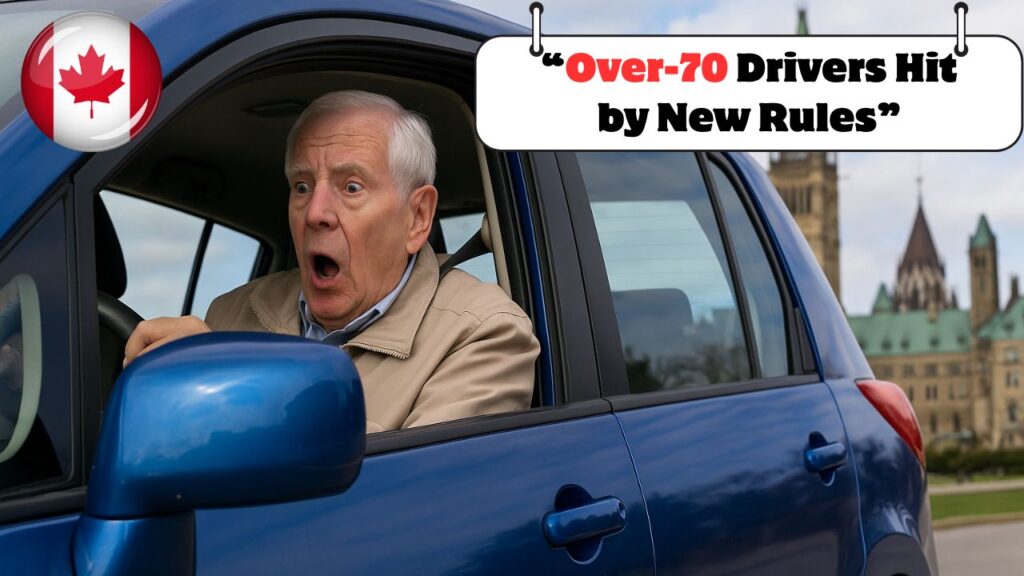Starting October 2025, Canadian seniors aged 70 and above will face stricter driving license renewal rules aimed at improving road safety and assessing driver fitness. The new regulations will introduce advanced medical evaluations, cognitive testing, and shorter renewal periods for older drivers. Transport Canada states these measures are designed to ensure that elderly drivers remain capable and alert behind the wheel. While the changes aim to enhance safety, they have raised concerns about fairness and accessibility, especially for seniors living in rural areas with limited public transportation options.

Understanding the New Driving License Rules for Seniors in Canada
From October 2025, all Canadian drivers aged 70 and older will be required to undergo an enhanced license renewal process. This includes a mandatory vision and cognitive assessment, as well as medical certification from an approved physician. The renewal validity will reduce from five years to three years, ensuring regular health evaluations. The rule is part of Transport Canada’s “Safe Roads Initiative 2025,” targeting reduced accident rates among senior drivers. Provinces such as Ontario and British Columbia will integrate these assessments into their existing driver testing systems.
Medical and Cognitive Tests for Drivers Over 70 in Canada
Under the updated Canadian driving laws, seniors must pass a set of physical and cognitive assessments before their licenses can be renewed. The cognitive evaluation will include reaction-time tests, attention assessments, and memory tasks designed to measure driver alertness. The medical report will need to be submitted annually for individuals with chronic health conditions like diabetes or heart disease. These steps aim to ensure that senior drivers maintain the physical and mental fitness required for safe driving, reducing the risk of road accidents caused by delayed response or vision impairment.
Impact on Elderly Drivers and Transportation Access Across Canada
While the stricter licensing rules are meant to improve safety, many Canadian seniors have expressed concerns over potential mobility restrictions. For those living in rural areas or small towns, where public transportation is limited, losing or delaying a license renewal could impact daily life significantly. Policymakers are urging provinces to offer alternatives such as discounted community transport services for seniors. The government also encourages families to support older relatives during the license renewal process, ensuring they can attend tests and maintain their independence safely.
How Seniors Can Prepare for the October 2025 Rule Implementation
Senior drivers are advised to start preparing early for the October 2025 rule changes. This means scheduling medical check-ups, updating prescriptions for vision correction, and practicing safe driving habits regularly. Transport Canada has also launched awareness programs and online resources to help older drivers understand the upcoming tests. Seniors who fail the initial evaluation will have options for additional training and retesting within a specific period. Proactive preparation can help older Canadians adapt smoothly to the new requirements and continue driving confidently and safely.
| Category | Details |
|---|---|
| Implementation Date | October 1, 2025 |
| Target Group | Drivers aged 70 years and above |
| New Requirements | Medical check-up, vision test, and cognitive assessment |
| License Validity | Reduced from 5 years to 3 years |
| Key Objective | Enhance road safety and reduce elderly-related accidents |
| Authority Involved | Transport Canada and Provincial Road Safety Departments |
| Alternative Options | Community transport and senior ride-sharing programs |
FAQs
Q1: When will the new driving license rules for seniors start in Canada?
A1: The new rules will take effect from October 1, 2025.
Q2: Who will be affected by the updated license renewal rules?
A2: All Canadian drivers aged 70 and above will be subject to the new renewal process.
Q3: What tests are required for license renewal after 70?
A3: Seniors must complete a medical exam, vision test, and cognitive assessment.
Q4: Can seniors appeal if their license renewal is denied?
A4: Yes, seniors can request a retest or appeal based on medical reassessment.



